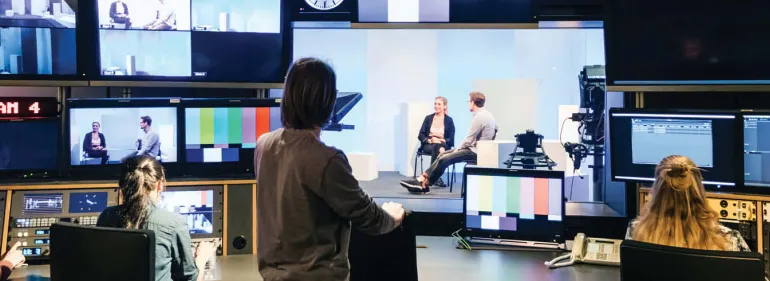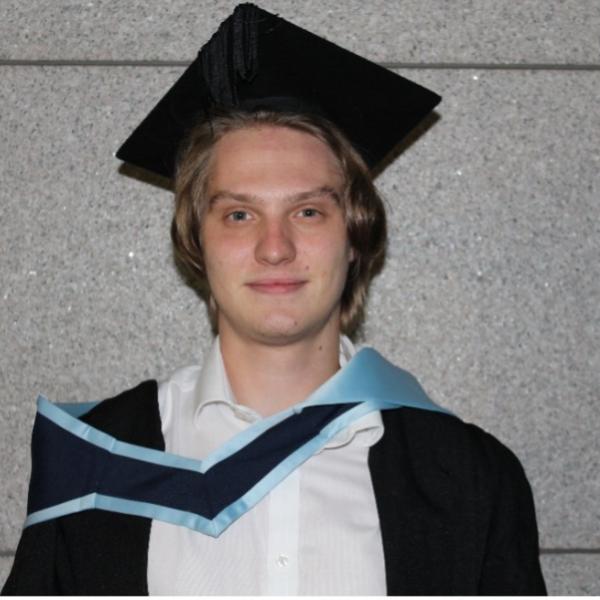Certificate in Live TV and Studio Broadcast

Course Overview
Build your portfolio and explore your creativity with this action-packed course.
The Certificate in Live TV and Studio Broadcast is ideal if you do not have a portfolio or degree in this area, as it offers you the core knowledge and skills needed to produce and broadcast live TV studio content at a professional level.
You will be encouraged to develop your creative practice and advance your knowledge, skills, and competencies through using a range of industry-standard TV studio and production technologies, and storytelling, presentation, and research approaches.
Why Study Live TV and Studio Broadcast at Griffith College?
The Certificate in Live TV and Studio Broadcast is a 20 ECTS, QQI-validated Level 8 Certificate, delivered over one academic year, and aimed at people with no prior experience or portfolio of work. On this course, we encourage learners to experiment and explore their creativity, enabling them to advance their knowledge, skills, and competencies using a comprehensive range of industry-standard TV studio technologies, storytelling, presentation and research approaches, and production techniques. The aim of the course is to assist learners to develop the practical skills and knowledge required to work in the demanding and multi-disciplinary world of modern live studio television production, direction and broadcast.
This course:
- Prepares learners for employment in the screen media industries
- Advances learners’ knowledge, skills, and competencies using a comprehensive range of technologies, and concept development, pre-production, and live studio production skills.
- Provides learners with the opportunity to gain new skills through the application of practical and conceptual skills and competencies in a wide variety of roles within multi-camera studio production environments.
- Gives learners the confidence to produce, manage and broadcast multi-camera studio-based content.
Facilities Available
- Fully equipped, industry-standard Film studio with black/white/green rail backdrop and 3x8 lighting rig
- Large selection of Cameras, including Black Magic and Sony studio cameras
- Full Apple MAC editing suite
- Full-frame Zoom & Prime lenses
- NewTek Tricaster 8000 Multi-Standard Vision Mixer with virtual studio environment
- Avid Media Composer, ProTools, and Adobe Suite
- Full range of equipment available for students to rent
Plus much more! For full list of equipment, please get in touch!
Intake Dates
Testimonials

The Live TV and Studio Broadcast course was very interesting. It was quite challenging the first time but it was a fantastic opportunity to gain professional skills. I learned a lot, there were interesting lecturers who were great professionals working in the industry and excellent facilities and equipment. I hope to work within live TV in a studio with this course.
Live TV and Studio Broadcast
Course Details
Course Modules
This module will introduce you to the fundamental production technologies in the multicamera TV studio setting. You'll be trained and tested – according to health and safety procedures – in each of these industry-standard TV studio technologies which include rigging, setup, operation, and derigging.
The objectives of the module are that:
- You gain experience practicing the skills necessary to perform the roles and responsibilities of each member of a TV studio crew.
- You also begin to develop their critical and creative skills in multicamera TV production.
- This module builds on the core single-camera production skills gained in the first semester of the programme in the following modules: Production and Direction for Screen, Sound Recording and Production 1, Introduction to Production Design, Introduction to Cinematography, and Introduction to Post-Production Editing 1.
This module facilitates the development of skills in the creative application of TV studio production technologies in a multi-camera environment.
During this module you will:
- Use industry-standard TV studio equipment and techniques to effectively tell stories within the conventions and genres of TV production.
- Build on the core single and multi-camera production skills gained in the first module of the course that will further enable you to critically analyse and creatively explore a number of genres in TV and multi-camera studio programming.
- Apply the skills gained in the module to their independent programme productions for the GCD TV channel in the second semester.
Building on the skillsets acquired as part of TV Studio Principles and TV Studio Practices in stages one and two of the programme, this module will further your creative application of TV studio production technologies in a multi-camera environment. You are tasked with exploring the use of industry-standard TV studio equipment and techniques in experimental audiovisual practices, which requires you to inventively apply multi-camera studio technologies and advanced keying, graphics, LiveSet and LiveMatte applications. You will develop and present an Independent studio practice project that will be produced in the TV studio over the course of the second semester.
Timetables
This course will be delivered two evenings or two afternoons a week over two semesters.
How to Apply
The Certificate in Live TV and Studio Broadcast programme is intended for applicants who have completed their secondary education and have experience working in the film and TV industry and want to upskill.
Entry Requirements
English Language
The English language entry requirements for the programme are CEF B2+ or equivalent. Candidates with English language levels below CEF B2+ must first reach this minimum standard before enrolling on the academic programme
How to Apply
This is a direct entry programme. All applicants can apply directly through our website.
Applicants under 23 years of age:
Applicants require a Leaving Certificate with a minimum of grade O6 / H7 in five subjects, or equivalent qualification. The five subjects must include Mathematics and English, Irish or another language.
Applicants over 23 years of age (Mature students):
Applicants over the age of 23, may also apply on the basis of work experience and/or life experience by demonstrating that they have reached the standards of knowledge, skills, and competence associated with NFQ Level 4 / 5.
Fees
For purposes of fee calculation, residence is counted from time of application.
Please note that not all study modes may be offered at all times; for confirmation, refer to the Intake dates on the Overview tab.
Tuition Fees
Study Mode: Part-Time
Dublin: EUR 2,250
(+ 250EUR Registration charge, + 2% Learner Charge of 50EUR + QQI Award Fee)
General Fee Information
An Academic Administration Fee of €250 is payable each September at the start of term. For students starting in the January/February term, €125 is payable in February, and then €250 will be payable each September from then onwards.
A 2% Learner Protection Charge is applicable each academic year in addition to the fees quoted. The fees below relate to Year 1 fees only.
Direct Debit Scheme
Students wishing to pay for their fees monthly may avail of our direct debit scheme. Please view our Fees information page to review the payment plan schedule and how to apply.
Sponsorship
Is your company paying for your course?
They will need to complete a Griffith College Sponsorship Form and send this to the Student Fees Office:
- Post: Student Fees, Griffith College Dublin, South Circular Road, Dublin 8
- Email: [email protected]
2% Learner Protection Charge
All QQI accredited programmes of education and training of 3 months or longer duration are covered by arrangements under section 65 (4) of the Qualifications and Quality Assurance (Education and Training) Act 2012 whereby, in the event of the provider ceasing to provide the programme for any reason, enrolled learners may transfer to a similar programme at another provider, or, in the event that this is not practicable, the fees most recently paid will be refunded.
QQI Award Fee
Please note that a QQI Award Fee applies in the final year of all QQI courses. To find the relevant fee for your course level, please see the Fees page.